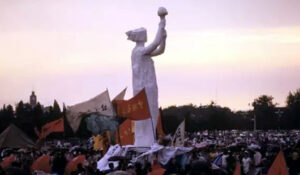Analysis by WorldTribune Staff, May 6, 2022
Communist authorities in China demanded that, before “Spider-Man: No Way Home” could be distributed in China, Sony would have to delete the Statue of Liberty from the movie’s climactic sequence.
Hollywood has in recent years gladly bowed to the demands of Chinese censors. This time, however, Sony refused to acquiesce. “Spider-Man: No Way Home” was not released in China.

The Statue of Liberty is a powerful symbol in China capable of revolutionizing the people as the communist authorities recognized in 1989. As Time magazine reported:
The Goddess of Democracy smiled on China for exactly five days. The papier-mâché likeness of the Statue of Liberty appeared in Tiananmen Square as protests convulsed Beijing and other cities seeking to unshackle the world’s most populous country from endemic corruption. Their calls for political reform were answered in the early hours of June 4, 1989, with a bloody military crackdown that crushed the movement and toppled its symbols.
The sequence which the Chinese Communist Party (CCP) could not tolerate features a 20-minute action scene in which characters battle amid scaffolding around the iconic landmark.
When Sony refused to delete the statue from the movie, Chinese authorities asked if the company could diminish the statue’s presence, Puck reported on Sunday, citing multiple sources.
It’s unclear whether Chinese censors blocked the movie’s release or if Sony preemptively opted against releasing it.
Even without being released in China, the third Spider-Man installment with actor Tom Holland in the lead role grossed about $1.9 billion worldwide, the sixth-highest movie release ever according to Box Office Mojo.
Sony’s refusal to bend to the CCP’s demands runs counter to Hollywood’s recent record of kowtowing.
Most recently, Warner Brothers removed dialogue referencing a homosexual relationship in “Fantastic Beasts: The Secrets of Dumbledore” in the version released in China.
In Paramount’s “Top Gun: Maverick”, the sequel of 1986 blockbuster “Top Gun”, Tom Cruise’s character puts on the iconic bomber jacket he wore in the original film — but with two key changes. Two jacket patches that had originally shown the Japanese and Taiwanese flags appear to have been swapped out and replaced with two ambiguous symbols in the same color scheme. Chinese tech giant Tencent is one of Paramount’s partners on the movie.
Disney has seen multiple controversies over its dealings in China, including when the credits of its 2020 live-action remake of Mulan thanked Chinese government entities in Xinjiang, where China is holding over 1 million Muslims in internment camps.
Actor and wrestling star John Cena apologized to Chinese fans in May 2021 for referring to Taiwan as an independent country. Cena initially said “Taiwan is the first country that can watch” F9, or “Fast and Furious 9”, in an interview on Taiwanese TV, but subsequently apologized to Chinese fans in a video message on Weibo.
About . . . . Intelligence . . . . Membership
